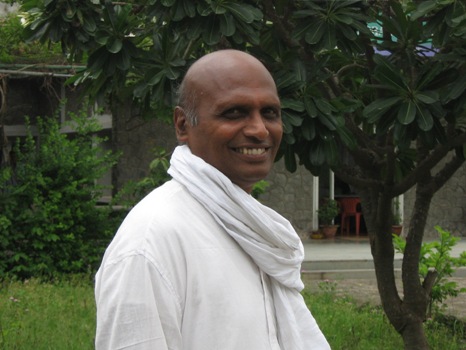Political
Notable new content: IELRC
Posted on 19 Jul, 2009 06:05 AM The International Environmental Law Research Centre (IELRC) (www.ielrc.org) is an independent, non-profit research organis
The International Environmental Law Research Centre (IELRC) (www.ielrc.org) is an independent, non-profit research organis
Tribute to Narendranath, an organic farmer who passed away in Hyderabad
Posted on 19 Jul, 2009 05:36 AMInternship positions at Arghyam
Posted on 18 Jul, 2009 07:38 AMArghyam's Grants Team is inviting applications from dedicated and talented students for their internship programme. Intern (Data and Analysis)
Rohini Nilekani: "A fine balance in Kutch"
Posted on 17 Jul, 2009 07:27 PMFrom Rohini Nilekani's "Uncommon Ground" column in Livemint
 As always, the monsoon may or may not come in time and in adequate quantity across the country. As always, again, people who live in the dry areas of the country, especially in the western desert districts of Rajasthan and Gujarat, with less than 250mm of average annual rainfall, will have to cope with scarcity, as they do year on year. Last week, I was in the Kutch region, on work, with soaring temperatures and no promise of rain despite an unusual cloud cover. We travelled a couple of hundred kilometres in the clay desert, despairing at the spread of Prosopis juliflora which—like so many other foreign species brought in by the forest department with all good intentions—has now overpowered large tracts of the countryscape, to the detriment of useful, hardy local species. We also marvelled at the raw beauty of the dry landscape, which yielded sudden delights such as a male nilgai in his prime and slender green bee-eaters diving gracefully in search of prey. Arid districts such as Kutch in Gujarat, and Barmer and Jaisalmer in Rajasthan mainly have livestock economies and it is not unusual to see thousands of animals—goats, cows, sheep, buffaloes and camels—moving amiably along in search of the next watering hole. It seems counter-intuitive that areas with such low rainfall should provide neighbouring states with meat and milk. IWMI (the International Water Management Institute) has done unique research to show how there is a massive export of virtual water from dry regions to wet through the sale of these products, leaving open some interesting questions on policy.
As always, the monsoon may or may not come in time and in adequate quantity across the country. As always, again, people who live in the dry areas of the country, especially in the western desert districts of Rajasthan and Gujarat, with less than 250mm of average annual rainfall, will have to cope with scarcity, as they do year on year. Last week, I was in the Kutch region, on work, with soaring temperatures and no promise of rain despite an unusual cloud cover. We travelled a couple of hundred kilometres in the clay desert, despairing at the spread of Prosopis juliflora which—like so many other foreign species brought in by the forest department with all good intentions—has now overpowered large tracts of the countryscape, to the detriment of useful, hardy local species. We also marvelled at the raw beauty of the dry landscape, which yielded sudden delights such as a male nilgai in his prime and slender green bee-eaters diving gracefully in search of prey. Arid districts such as Kutch in Gujarat, and Barmer and Jaisalmer in Rajasthan mainly have livestock economies and it is not unusual to see thousands of animals—goats, cows, sheep, buffaloes and camels—moving amiably along in search of the next watering hole. It seems counter-intuitive that areas with such low rainfall should provide neighbouring states with meat and milk. IWMI (the International Water Management Institute) has done unique research to show how there is a massive export of virtual water from dry regions to wet through the sale of these products, leaving open some interesting questions on policy.
National-level engineers' training on Decentralized Wastewater Treatment systems (DEWATS), CDD, Bangalore
Posted on 16 Jul, 2009 10:34 PM![]()
The Consortium for DEWATS Dissemination (CDD) Society is a not-for-profit organisation working in the field of decentralised basic need services across India. Decentralised solutions for wastewater treatment, water and energy supply, solid waste management and urban sanitation planning are successfully promoted for the past ten years.
CDD aims to create a knowledge base for up-scaling decentralised basic need services through its capacity building approach. CDD Society, in partnership with Bremen Overseas Research and Development Association (BORDA), Germany and Rajiv Gandhi Rural Housing Corporation Limited (RGRHCL) is organising a 6 days training programme on decentralised wastewater treatment systems (DEWATS) from 17th August to 22nd August, 2009 in Bangalore. The training aims to impart skills required for planning, implementing and managing DEWATS to the participants.
A survey for household water and sanitation (ASHWAS)
Posted on 15 Jul, 2009 11:27 PM The Water Portal had previously covered ASHWAS, an ambitious water and sanitation survey in Karnataka conducted by Arghyam and partner organisations.
The Water Portal had previously covered ASHWAS, an ambitious water and sanitation survey in Karnataka conducted by Arghyam and partner organisations.
An interactive, animated tool on good water management by CEE and UNEP
Posted on 14 Jul, 2009 03:25 PMAn interactive, animated tool on good water management by CEE and UNEP
Watch Movie
Health and sanitation: Animation video of how Anand and the doctor transform their village
Posted on 14 Jul, 2009 02:39 PMTime: 1:46 minutes
International on-site training programme on community-based microhydro power units ( 21 September 2009- 2 October 2009) by LEDeG and BORDA
Posted on 14 Jul, 2009 12:38 AMLadakh Ecological Development Group(LEDeG) in collaboration with Bremen Overseas Research and Development Agency(BORDA) has been promoting environmentally friendly Decentralized Renewable Energy Systems (DERES) for the last 20 years in the Western Himalaya.
The economics of climate change in Southeast Asia: a regional review
Posted on 13 Jul, 2009 09:53 AMClimate change will affect everyone but developing countries will be hit hardest, soonest and have the least capacity to respond. South East Asia is particularly vulnerable to the impacts of climate change with its extensive, heavily populated coastlines, large agricultural sectors and large sections of the population living under $2 or even $1 a day.
